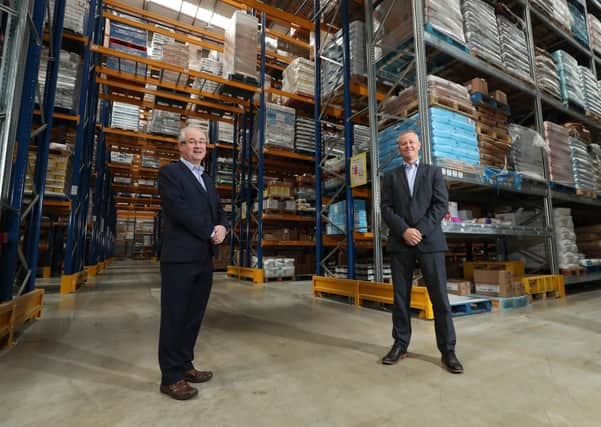Climate change debate gets real


Courtesy of his presentation, he indicated that a number of the targets contained within the Private Member’s Climate Change Bill for Northern, currently under scrutiny by MLAs, are not realistic.
Deben specifically cited the proposal to make Northern Ireland Carbon Neutral by 2045 in this context. In contrast, his own committee has advised that Northern Ireland should be able cut its carbon emissions by at least 82% by 2050, in order to help the UK achieve its net zero ambition.
Advertisement
Advertisement
Meanwhile Northern Ireland’s largest food distributor, the Henderson Group, has confirmed that local food processors supplying the business will have to prioritise climate change as part of their growth strategies for the future. Moreover, developments of this nature will have a direct impact on production agriculture.
Henderson’s Group Logistics Director Pat McGarry takes up the story: “During the period 2007 to 2020 the Intensity Ratio metric for the entire Henderson’s business fell by 50%. This is the most effective and independent way of defining the emissions-related data that relate to any business.
“The success that we have achieved in this regard is set to be built upon courtesy of the recently completed £16 million warehouse facility at our Mallusk complex.
He added:“We take the challenge of climate change very seriously. We actively encourage our suppliers on this matter.
Advertisement
Advertisement
“Obviously, we want them to be on the same page with us, where climate change is concerned. And, no doubt, this very important message will be communicated back to farmers and primary producers.
“The Henderson Group at Mallusk is ISO 14001 compliant. This is the international standard for environmental management systems. And we want to build on this for the future.”
The design and build of the new warehouse has incorporated the latest sustainability and energy efficiency techniques including maximisation of natural light in work areas and any artificial lighting installed is photo and movement sensitive.
Other features include a state of the art charging optimiser for all mechanical handling equipment and an energy optimised refrigeration system. Packaging waste is recycled or reused whilst food wastage is minimised and any generated is processed for re-use via an anaerobic digestion plant for gas production.
Advertisement
Advertisement
Henderson Foodservice Managing Director, Cathal Geoghegan, praised the Foodservice warehouse project team for its successful and streamlined transition to the new distribution centre saying:
“As hospitality has thankfully been able to open up, our move couldn’t have been more timely. We’re thrilled to be able to support the industry in what has been such a challenging year and we look forward to working closely with our customers as the economy continues to move forward in a positive trajectory.”
The design, build and fit-out of our new warehouse was developed in partnership with Fermanagh based construction company Tracey Brothers who had previously completed Henderson’s ambient warehouse facility in 2017.
This latest project is Phase Three of a Henderson Group re-development investment strategy first conceived in 2008. The initial phase featured a Foodservice depot completed in 2010 followed by Group head offices doubling the company’s office space in 2016.
Advertisement
Advertisement
In 2017 the Group bought an adjacent Marks & Spencer distribution centre which was remodelled into an 185,000 square foot ambient temperature depot.
Looking to the future Henderson Group is currently planning business requirements up to 2040.
Meanwhile, Ulster Unionist spokesperson on Agriculture, Environment and Rural Affairs has said that the UK Climate Change Committee (CCC) Chairman Lord Deben clearly outlined the need for food imports to the UK to be of at least a similar standard to those required for food production in the UK. Lord Deben was presenting to the NI Assembly Committee of Agriculture, Environment & Rural Affairs (AERA) on Thursday of this week.
Mrs Barton said: “The AERA Committee are currently taking evidence on the Green Party Climate Change Bill. This week the Chairman of the UK Climate Change Committee Lord Deben gave evidence of the Committee research and provided clear reasoning for them recommending NI should have a target of 82% carbon reduction by 2050, as opposed to the current proposals in the Climate Change Bill of zero carbon emissions by 2045.
Advertisement
Advertisement
“In response to questions on this matter Lord Deben repeated on a number of occasions that there is no point setting a target that research clearly says is not possible to meet.”
Mrs Barton also questioned Lord Deben on the potential of food security and additional food miles if there is much less food produced in the UK due to climate change legislation.
She continued: “Lord Deben was very clear by indicating that the last thing we want to do is to import goods from elsewhere. The carbon footprint in the UK is one of the lowest in the world, and imports from other countries would significantly increase this carbon footprint, resulting with a very negative impact on climate change.
“The CCC Chairman further highlighted that the Committee are clear that the government must not allow food importation from countries that are not meeting the same production standards as there is in the UK. He went on to praise the standards of food production in NI.
“It is vital that proposals for climate change improvements do not have the opposite effect and as already highlighted it is not sensible to demand people to do things that they cannot achieve.”